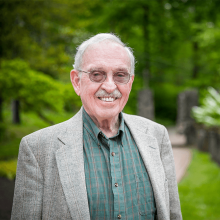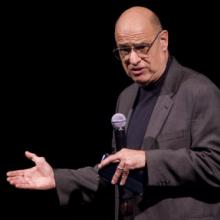Red Letter Christians
Ronald J. Sider, founder of Christians for Social Action and a stalwart evangelical advocate for social justice, died of a cardiac arrest on July 27. He was 82 years old.

Image via Heidi Besen/Shutterstock.com
I’m grateful for the 10 governors — Republican and Democrat — who wrote to senators asking them to reject the so-called “skinny repeal” because of how it would affect their residents.
I’m grateful for the thousands of you who heeded Sojourners’ call and contacted your member of Congress to voice your opposition to any bill that would hurt the poor with devastating cuts to Medicaid.

Image via NYCStock/Shutterstock.com
Dec. 4 was a beautiful reminder, in the long struggle for justice, that, no matter how long we wait, God hears our cry. And love and justice will win.
A few weeks ago, Chief Arvol Looking Horse issued an invitation to clergy and faith leaders to stand in solidarity with the people of Standing Rock. He said he was hoping maybe 100 would respond. But I joined thousands, in a procession of faith leaders, to gather around the sacred fire at the Oceti Sakowin Camp at Standing Rock.
I knew something special was happening here.
Red Letter Christian and Sojourners President Jim Wallis recently published America’s Original Sin: Racism, White Privilege and the Bridge to a New America.
Tony Campolo, a progressive evangelical leader who counseled President Bill Clinton through the Monica Lewinsky scandal, announced that the organization he founded nearly 40 years ago will close on June 30.
Campolo, 78, plans to retire with the closure of the Evangelical Association for the Promotion of Education, but he will continue to write and speak, with nearly 200 engagements scheduled for 2014. He said his health is fine and he wants to write one more book on how Christianity fits with the social sciences.
By June, Campolo said he anticipates there will be about $300,000 left to distribute to the off-shoot ministries started by the larger EAPE. The 22 ministries that were started under EAPE now operate independently and will continue, including Red Letter Christians, where Campolo plans to spend most of his time.
TONY CAMPOLO: Shane, I have a question to ask that may make you squirm a little bit. From hearing you talk and reading your books, you often seem to suggest that Christians not participate in the political process, and that political activism is somewhat futile. Have I understood your position correctly?
SHANE CLAIBORNE: The question for me is not are we political, but how are we political? We need to be politically engaged, but peculiar in how we engage. Jesus and the early Christians had a marvelous political imagination. They turned all the presumptions and ideas of power and blessing upside down.
The early Christians felt a deep collision with the empire in which they lived, and with politics as usual. They carelessly crossed party lines and built subversive friendships. And we should do that too. To be nonpartisan doesn’t mean we’re nonpolitical. We should refuse to get sucked into political camps and insist on pulling the best out of all of them. That’s what Jesus did—challenge the worst of each camp and pull out the best of each. That’s why we see Essenes, Zealots, Herodians, Pharisees, and Sadducees all following Jesus and even joining his movement. But they had to become new creations. They had to let go of some things. Jesus challenged the tax-collecting system of Rome and the sword of the Zealots.
So to answer the question, I engage with local politics because it affects people I love. And I engage in national politics because it affects people I love.
Governments can do lots of things, but there are a lot of things they cannot do. A government can pass good laws, but no law can change a human heart. Only God can do that. A government can provide good housing, but folks can have a house without having a home. We can keep people breathing with good health care, but they still may not really be alive. The work of community, love, reconciliation, restoration is the work we cannot leave up to politicians. This is the work we are all called to do. We can’t wait on politicians to change the world. We can’t wait on governments to legislate love. And we don’t let policies define how we treat people; how we treat people shapes our policies.
TONY CAMPOLO: So you are not calling for noninvolvement in politics. Instead, you are warning Christians not to put their trust totally in political powers. You are calling them to exercise an ongoing involvement with the political process, to constantly speak truth to power in those places where power seems to be asserting itself in ways that are contrary to the will of God.

Red letter Bible via Wylio http://bit.ly/wk2149
The need for Red Letter Christians to no longer be labeled "evangelicals" became abundantly clear this past Saturday following the South Carolina Republican Primary. Most Evangelicals claim to be politically non-partisan, and say they only identify with the Republican Party because the Republicans are committed to "family values."
The truthfulness of that claim became questionable this past Saturday when South Carolina Evangelicals voted in surprisingly large numbers for Newt Gingrich, in spite of the fact that he's hardly a model husband in their eyes. Not only is he on his third wife, having had divorce papers served to one of them while she was lying in a hospital bed recovering from a mastectomy for breast cancer, but, if his second wife is to believed, wanted an "open marriage" so that he could have a sexual affair on the side.
Now Mr. Gingrich has been converted to Catholicism, and has, as part of his conversion, confessed his sin and asked for God's forgiveness. Evangelicals will say that this being the case we should forgive, forget and move on "to other concerns." I have to ask, however, why they didn't do this when a Democratic president repented of his sin?


